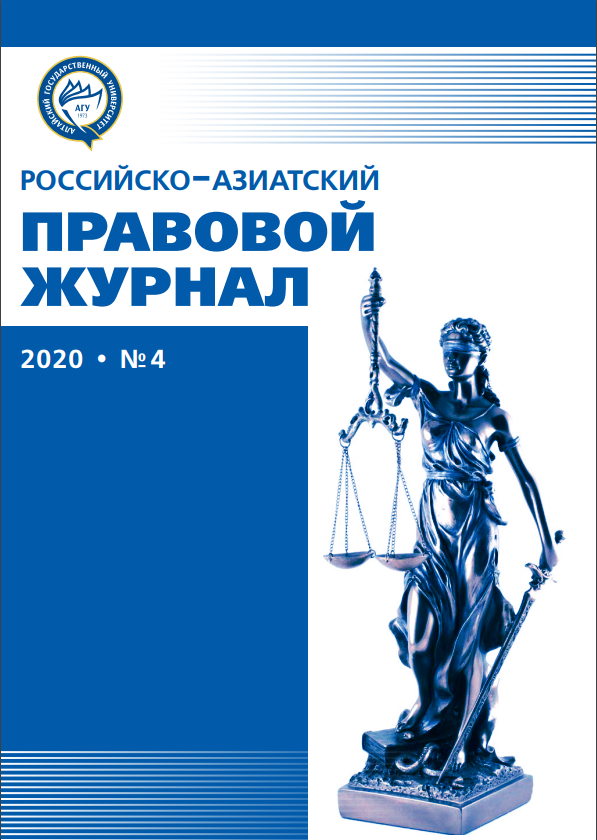RELATIONSHIPS APROPOS IN-GAME INDUSTRY OBJECTS
УДК 347.211 ББК 67.404.3
Abstract
The article is devoted to consideration of in-game industry objects, their legal nature and relationshipswith them. At the present stage of information technologies development, various means of leisure areincreasingly popular, in particular online games. It is also important that from the category of children’sgames, such leisure has grown into the rank of serious hobbies, accompanied by significant financialinvestments, which determined the relevance of this work. The incorporation of commodity-money relationsinto in-game ones inevitably entails the need to interpret such relations from the legal point of view. In orderto substantiate the need for legal regulation of relations with respect to the objects of the in-game industryusing the dialectical method, analysis and synthesis, various relations emerging with respect to such objectsare considered, constructions, including those developed by foreign authors, are proposed, which makes itpossible to delimit the range of subject relations to regulation by law. Various positions of understanding thiskind of relations are identified and briefly presented, also the possibility of using one of them is substantiated.The judicial practice of the Russian Federation on this issue was criticized, and the unfairness of the approachused by the Russian courts was revealed. As a result of the study, the authors propose to consider the relationsabout in-game objects as licensed.
Downloads
References
2. Дюранске Б.Т., Кейн Ш.Ф. Виртуальные миры, реальные проблемы / пер. с англ. В.В. Архипова // Правоведение. 2013. №2. С. 115–134. URL: https://cyberleninka.ru/article/n/virtualnye-miryrealnye-problemy/viewer (дата обращения: 01.09.2020).
3. Blizzard Entertainment, Inc. Восстановление предметов в World of Warcraft. URL: https://eu.battle.net/support/ru/article/16572 (дата обращения: 01.09.2020).
4. Сергей Будылин. Дело о волшебной маске, или Можно ли украсть несуществующее? URL: https://zakon.ru/blog/2017/5/10/delo_o_volshebnoj_maske_ili_mozhno_li_ukrast_nesuschestvuyu chee(дата обращения: 01.09.2020)
5. Архипов В. В., Рыбалов А. О. Право собственности на виртуальные объекты. URL: https:// lfacademy.ru/course/1496348/1496377? autoplay=t (дата обращения: 01.09.2020).
6. Горохова О. Н. «Игровое имущество» как разновидность «Виртуального имущества» // E-commerce и взаимосвязанные области (правовое регулирование) : сборник статей / А.А. Богустов, О.Н. Горохова, Д.А. Доротенко и др. ; рук. авт. кол. и отв. ред. М.А. Рожкова. М. : Статут, 2019. 448 с.
7. Победоносцев К.П. Курс гражданского права. Первая часть: Вотчинные права. М. : Статут, 2002. URL: http://civil.consultant.ru/elib/books/15/ (дата обращения: 01.09.2020)
8. Савельев А.И. Правовая природа виртуальных объектов, приобретаемых за реальные деньги в многопользовательских играх // Вестник гражданского права. 2014. №1. С. 127–150 // КонсультантПлюс.
9. Останина Е.А. Основание присоединения к многопользовательской онлайн игре — договор с участием потребителей // Право в сфере Интернета: сборник статей / рук. авт. кол. и отв. ред. д.ю.н. М.А. Рожкова. М. : Статут, 2018. С. 311–345 // КонсультантПлюс.
10. Решение мирового суда судебного участка №352 Басманного района г. Москвы от 1 февраля 2011 г. №2–01/11 // КонсультантПлюс.
11. Волчек Е. В. Жизнеспособность игровых аккаунтов и виртуальных игровых объектов в деле о банкротстве. URL: https://zakon.ru/blog/2020/4/9/zhiznesposobnost_igrovyh_akkauntov_i_virtualnyh_igrovyh_obektov_v_dele_o_bankrotstve#_ftn11 (дата обращения: 01.09.2020)
12. Архипов В.В. Интеллектуальная собственность в индустрии компьютерных игр: проблемы теории и практики // Закон. 2015. №11. С. 61–69 // КонсультантПлюс.
13. Wargaming. Лицензионное соглашение от 01.04.2017 г. URL: https://legal.ru.wargaming.net/ru/eula/ (дата обращения: 01.09.2020).
14. Райзберг Б.А., Лозовский Л.Ш., Стародубцева Е.Б. Современный экономический словарь. 6-е изд., перераб. и доп. М., 2011 // КонсультантПлюс.
15. Договорное и обязательственное право (общая часть) постатейный комментарий к статьям 307–453 Гражданского кодекса Российской Федерации / В.В. Байбак, Р.С. Бевзенко, О.А. Беляева и др.; отв. ред. А.Г. Карапетов. М. : М-Логос, 2017 // КонсультантПлюс.
Russian-Asian Law Journal is a golden publisher, as we allow self-archiving, but most importantly we are fully transparent about your rights.
Authors may present and discuss their findings ahead of publication: at scientific conferences, on preprint servers, in public databases, and in blogs, wikis, tweets, and other informal communication channels.
Russian-Asian Law Journal allows authors to deposit manuscripts (currently under review or those for intended submission) in non-commercial, pre-print servers such as ArXiv.
Authors who publish with this journal agree to the following terms:
- Authors retain copyright and grant the journal right of first publication with the work simultaneously licensed under a Creative Commons Attribution License that allows others to share the work with an acknowledgement of the work's authorship and initial publication in this journal.
- Authors are able to enter into separate, additional contractual arrangements for the non-exclusive distribution of the journal's published version of the work (e.g., post it to an institutional repository or publish it in a book), with an acknowledgement of its initial publication in this journal.
- Authors are permitted and encouraged to post their work online (e.g., in institutional repositories or on their website) prior to and during the submission process, as it can lead to productive exchanges, as well as earlier and greater citation of published work (See The Effect of Open Access).








